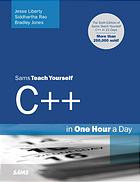

Most ebook files are in PDF format, so you can easily read them using various software such as Foxit Reader or directly on the Google Chrome browser.
Some ebook files are released by publishers in other formats such as .awz, .mobi, .epub, .fb2, etc. You may need to install specific software to read these formats on mobile/PC, such as Calibre.
Please read the tutorial at this link. https://ebooknice.com/page/post?id=faq
We offer FREE conversion to the popular formats you request; however, this may take some time. Therefore, right after payment, please email us, and we will try to provide the service as quickly as possible.
For some exceptional file formats or broken links (if any), please refrain from opening any disputes. Instead, email us first, and we will try to assist within a maximum of 6 hours.
EbookNice Team

Status:
Available0.0
0 reviews
ISBN 10: 0672329417
ISBN 13: 9780672329418
Author: Jesse Liberty, Siddhartha Rao, Bradley Jones
Sams Teach Yourself C Programming in One Hour a Day, Seventh Edition is the newest version of the worldwide best-seller Sams Teach Yourself C in 21 Days. Fully revised for the new C11 standard and libraries, it now emphasizes platform-independent C programming using free, open-source C compilers. This edition strengthens its focus on C programming fundamentals, and adds new material on popular C-based object-oriented programming languages such as Objective-C. Filled with carefully explained code, clear syntax examples, and well-crafted exercises, this is the broadest and deepest introductory C tutorial available. It’s ideal for anyone who’s serious about truly mastering C – including thousands of developers who want to leverage its speed and performance in modern mobile and gaming apps. Friendly and accessible, it delivers step-by-step, hands-on experience that starts with simple tasks and gradually builds to professional-quality techniques. Each lesson is designed to be completed in hour or less, introducing and clearly explaining essential concepts, providing practical examples, and encouraging you to build simple programs on your own. Coverage includes: Understanding C program components and structure Mastering essential C syntax and program control Using core language features, including numeric arrays, pointers, characters, strings, structures, and variable scope Interacting with the screen, printer, and keyboard Using functions and exploring the C Function Library Working with memory and the compiler Contents at a Glance PART I: FUNDAMENTALS OF C 1 Getting Started with C 2 The Components of a C Program 3 Storing Information: Variables and Constants 4 The Pieces of a C Program: Statements, Expressions, and Operators 5 Packaging Code in Functions 6 Basic Program Control 7 Fundamentals of Reading and Writing Information PART II: PUTTING C TO WORK 8 Using Numeric Arrays 9 Understanding Pointers 10 Working with Characters and Strings 11 Implementing Structures, Unions, and TypeDefs 12 Understanding Variable Scope 13 Advanced Program Control 14 Working with the Screen, Printer, and Keyboard PART III: ADVANCED C 15 Pointers to Pointers and Arrays of Pointers 16 Pointers to Functions and Linked Lists 17 Using Disk Files 18 Manipulating Strings 19 Getting More from Functions 20 Exploring the C Function Library 21 Working with Memory 22 Advanced Compiler Use PART IV: APPENDIXES A ASCII Chart B C/C++ Reserved Words C Common C Functions D Answers
Getting Started
The Anatomy of a C++ Program
Using Variables, Declaring Constants
Managing Arrays and Strings
Working with Expressions, Statements, and Operators
Organizing Code with Functions
Controlling Program Flow
Pointers Explained
Exploiting References
Classes and Objects
Implementing Inheritance
Polymorphism
Operator Types and Operator Overloading
Casting Operators
An Introduction to Macros and Templates
An Introduction to the Standard Template Library
The STL string Class
STL Dynamic Array Classes
STL list
STL set and multiset
STL map and multimap
Understanding Function Objects
STL Algorithms
Adaptive Containers: stack and queue
Working with Bit Flags Using STL
Understanding Smart Pointers
Working with Streams
Exception Handling
Tapping Further into the Preprocessor
Working with Numbers: Binary and Hexadecimal
C++ Keywords
Operator Precedence
Answers
c++ 6 hours
c++ 4 hours
learn c++ in 31 hours
c++ in one hour a day sams teach yourself
c++ 12 hours
c++ in hours
Tags: Jesse Liberty, Siddhartha Rao, Bradley Jones, hour, day